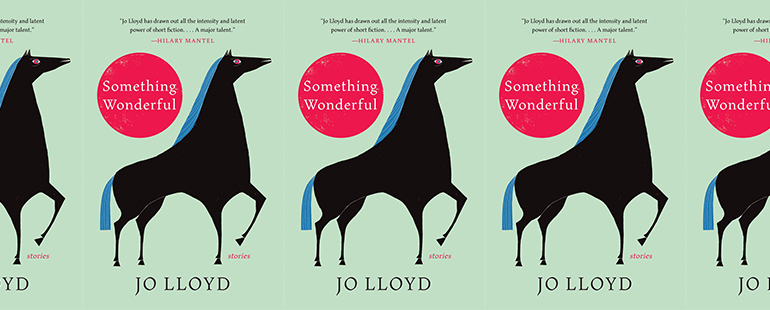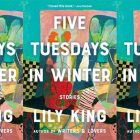Seeking Meaning and Survival in Something Wonderful

Something Wonderful
Jo Lloyd
Tin House | August 24, 2021
In “The Ground the Deck,” a story from Jo Lloyd’s debut collection Something Wonderful, a character named Megan reflects on why she left her hometown and moved to the city: “She knew she was doing the right thing. She was going to a place where nobody sat waiting for death and disaster . . .” But how can we bumbling humans ever evade death and disaster? Can place or history or religion offer transcendence from our most insistent existential struggles? In Lloyd’s stories, characters seek meaning—or, more usually, something even remotely worth living for—as they suffer through the predominant exploitations of their times, whether that be the terrors of sea voyage in nineteenth-century Scotland or the perils of restaurant work in modern-day London.
What makes Lloyd’s stories so incisive, however, is that contemplations of death and despair announce themselves deftly, their presence a secret you unsuspectingly uncover. In “My Bonny,” a woman named Agnes lives a life filled with misfortune. Spanning the 1800s, everyone in her life dies or abandons her, most notably her husband, James, who drowns in a boat crash. A rare glimpse into Agnes’s head tells us that she often dreams of the tide rising until it reaches her bed, swallowing her up. When she finally dies of old age, it’s a peaceful and poetic sendoff; she feels “a temporary ease . . . without pain.” In a life haunted by the omnipresent specter of death, this understated climax offers a soothing and profound possibility: that maybe, one day, even in death, we will be free of suffering.
In another period piece, “The Earth, Thy Great Exchequer, Ready Lies,” a team of miners pursue new land to conquer. The protagonist, HM, is a ruthless entrepreneur who “squeeze[es] profit from land” and buys into “ingenious new ideas he’d seen—gunpowder, engines of fire and water, systems of draining and ventilating.” But now, in heaps of debt, he needs a new place to mine or he’ll lose his fortune and power. When he dies on a quest to find such a place, the narrative duties transfer to a higher historical intelligence: “Wars are fought, empires spread and contract, fortunes are lost and recovered . . . Nature herself is employed to break open her treasury . . . At night, the stars, the planets, the moon herself are dimmed by the glitter of furnaces.” This coda suggests that while humans are free to destroy the earth in the name of dollar signs and development, such conquests are ultimately futile. We die and the earth lives. Trying to conquer nature is merely an acceleration of our own demise.
Because the aforementioned stories stylistically mirror the era they occupy, it’s impressive when Lloyd shifts into a contemporary voice. In “Ade/Cindy/Kurt/Me,” a woman named Trish recalls a time when she lived with Ade, a barkeep who has “tattoos on his arms and neck and three earrings all in the same ear . . . not realizing that what people liked about him was that he was harmless as a puppy.” Living with Ade prevents Trish from “behaving badly,” which she both appreciates and resents about him. During Ade’s birthday party, Trish sneaks out with her friend’s date, Kurt, in a desperate attempt to rekindle her bad side: “No one likes to believe they deliberately set out to do a bad thing . . . just, I really wanted to do it.” An older Trish, reflecting on the experience, feels a peculiar, unshakeable guilt: “[I wanted] to hit the back button. But the moment was gone, passed irretrievably into the past, and I hadn’t even been paying proper attention while it was there.” Lloyd thrives when dramatizing the morass of the modern condition: economic destitution, epistemological vacuity, and the abandonment of morality.
One of the collection’s strongest story’s, “Deep Shelter,” best represents Lloyd’s intellectual interests. Set in 1951, John leaves home after being drafted into England’s military. A month into his service, he learns that his father has left his mother and sister without explanation. John tracks down his father and confronts him, asking why he left the family and where he plans to go. “We are on the brink of marvellous achievements,” John’s father responds. “Electronic brains and mechanical men. The end of disease and starvation. This will be a golden age of discovery . . . I should like to experience it all. This century and next.” John never sees his father again and is left to ponder the mystery of the man he thought he knew. Yet in the story’s dénouement, John realizes the foible of his father’s vision, the one that prompted him to leave the family:
Only the advancement of knowledge could save us. Science would build the machines that would allow humanity to step out into the solar system and beyond. The petty grievances of the earth would be dwarfed by the new adventure. Our world would finally come to seem—perhaps during my life, perhaps even by the end of the century—a noisy, crowded place where we had passed a little time before moving out into the grand, airy habitations of the universe.
Something Wonderful ripples with intelligence and heart. Lloyd writes brilliantly about both the past and present, locating humanity’s most elemental anxieties in misbegotten characters who want, above all else, to find a way to keep living.



